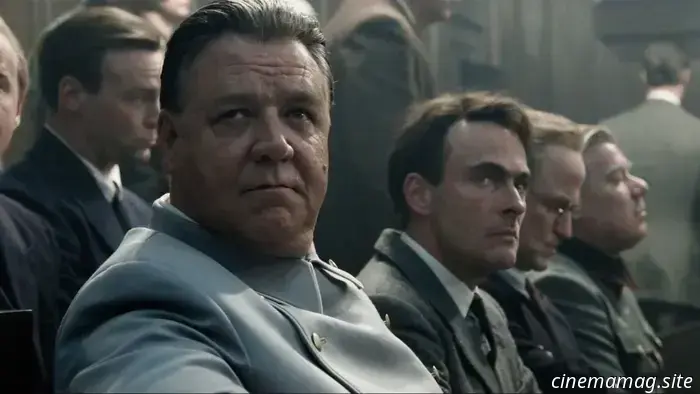
TIFF Review: Nuremberg Falls Short on Depth and Engaging Drama
Stanley Kubrick famously criticized his friend Steven Spielberg's Schindler’s List for focusing on the 600 survivors rather than the six million victims of the Holocaust. Although applying moral standards to film doesn't always lead to engaging discussions or quality cinema, Kubrick's comment comes to mind when viewing Nuremberg, the new film detailing the post-WWII trials that held high-ranking Nazi commanders accountable. The film seems unsure about its own stance on the true nature of the atrocity, caught between the desire to please audiences and a supposedly chilling conclusion.
Nuremberg starts on the final day of WWII in Germany, showcasing American soldiers urinating on a swastika—indicating the movie's unexpected reliance on humor—before they apprehend Hermann Goring (Russell Crowe), Hitler's second-in-command. The film depicts the beginning of one of history's most significant trials, led by U.S. Supreme Court Justice Robert H. Jackson (Michael Shannon), who aims to involve all of Europe’s major powers, including Britain, the Soviets, and even the Catholic Church. The trial proves to be complex, leading to the enlistment of American military psychiatrist Douglas Kelley (Rami Malek) to assist in analyzing the crafty Goring to effectively bring him to court.
Despite the grave subject matter, Nuremberg is more reminiscent of the works of Joseph H. Mankiewicz or Billy Wilder rather than Stanley Kramer’s film on the same topic. Each character is witty, and writer-director James Vanderbilt appears to intentionally avoid letting the film become too heavy. There’s also a hint of post-Oppenheimer pacing, helping it maintain a brisk tempo, which prevents it from feeling overly burdensome despite its two-and-a-half-hour duration.
The film begins to struggle significantly once it enters the courtroom, revealing a lack of depth. Nuremberg attempts to create a psychological duel between Kelley and Goring, with Kelley perhaps perceiving a more nuanced figure than the universally vilified image of Goring; however, it quickly becomes clear that Goring is as sinister as he’s portrayed. What’s the purpose of a film where the protagonist merely tries to catch up to the ethical bureaucrats in supporting roles?
For the first two acts, Nuremberg is engaging enough, but by the end, one begins to question the overall intention behind the project, which tries to convey a broader message about the nature of evil, unsupported by the preceding narrative. It seems to want the audience to leave with a sense of discomfort, but it's likely that viewers will instead be recounting Michael Shannon's confrontational address to the Pope regarding antisemitism, complete with an Aaron Sorkin-style punchline.
Nuremberg premiered at the 2025 Toronto International Film Festival and is set to release on November 7.
Other articles
-Movie-Review.jpg) Obsession (2025) - Film Review
Obsession, 2025. Directed by Curry Barker. Featuring Michael Johnston, Inde Navarrette, Cooper Tomlinson, Megan Lawless, Andy Richter, Chloe Breen, and Darin Toonder. SYNOPSIS After a hopeless romantic wishes for his long-time crush to love him back, a dark spell unfolds in writer-director Curry Barker’s eerie and chilling feature debut. We are all aware of […]
Obsession (2025) - Film Review
Obsession, 2025. Directed by Curry Barker. Featuring Michael Johnston, Inde Navarrette, Cooper Tomlinson, Megan Lawless, Andy Richter, Chloe Breen, and Darin Toonder. SYNOPSIS After a hopeless romantic wishes for his long-time crush to love him back, a dark spell unfolds in writer-director Curry Barker’s eerie and chilling feature debut. We are all aware of […]
 TIFF Review: Aziz Ansari’s Good Fortune is a Charming and Relevant Comedy
Hearing a tale from Azrael (Stephen McKinley Henderson) reveals the true extent of an angel’s purpose. He goes beyond merely being concerned about natural calamities or igniting creativity— he saves lives by reaffirming the worth of lost souls. Gabriel (Keanu Reeves) is irresistibly inspired and wishes to emulate those noble actions. However, he is
TIFF Review: Aziz Ansari’s Good Fortune is a Charming and Relevant Comedy
Hearing a tale from Azrael (Stephen McKinley Henderson) reveals the true extent of an angel’s purpose. He goes beyond merely being concerned about natural calamities or igniting creativity— he saves lives by reaffirming the worth of lost souls. Gabriel (Keanu Reeves) is irresistibly inspired and wishes to emulate those noble actions. However, he is
 Trailer for the Japanese historical epic, Samurai Fury.
Well Go USA has unveiled a poster and trailer for the action-filled Japanese historical epic Samurai Fury, directed by Irie Yu. The film, inspired by Ryosuke Kakine’s novel Muromachi Burai, follows a wayward rebel who assembles a group of unconventional warriors to overthrow the shogun and rescue their nation from destruction. The cast features Oizumi […]
Trailer for the Japanese historical epic, Samurai Fury.
Well Go USA has unveiled a poster and trailer for the action-filled Japanese historical epic Samurai Fury, directed by Irie Yu. The film, inspired by Ryosuke Kakine’s novel Muromachi Burai, follows a wayward rebel who assembles a group of unconventional warriors to overthrow the shogun and rescue their nation from destruction. The cast features Oizumi […]
 New teaser for The Smashing Machine featuring Dwayne Johnson.
After its world premiere at the Venice International Film Festival, where director Benny Safdie won the Silver Lion award, A24 has released a new trailer for the highly praised biographical sports drama The Smashing Machine. The film features Dwayne Johnson in the role of MMA and UFC fighter Mark Kerr, with Emily Blunt co-starring as […]
New teaser for The Smashing Machine featuring Dwayne Johnson.
After its world premiere at the Venice International Film Festival, where director Benny Safdie won the Silver Lion award, A24 has released a new trailer for the highly praised biographical sports drama The Smashing Machine. The film features Dwayne Johnson in the role of MMA and UFC fighter Mark Kerr, with Emily Blunt co-starring as […]
 Spain appears on the horizon with the September update of World of Warships: Legends.
The September update for World of Warships: Legends has arrived, introducing a variety of new content, including the new Spanish cruisers, The Shield of Troy campaign, a Golden Tide event, the return of an Azur Lane collaboration, and additional features. Spain embarks on its maritime journey with new cruisers accessible through the Tech Tree line. There are […]
Spain appears on the horizon with the September update of World of Warships: Legends.
The September update for World of Warships: Legends has arrived, introducing a variety of new content, including the new Spanish cruisers, The Shield of Troy campaign, a Golden Tide event, the return of an Azur Lane collaboration, and additional features. Spain embarks on its maritime journey with new cruisers accessible through the Tech Tree line. There are […]
 Chloe Zhao and the Hamnet Cast Discuss Grief and Dance Sequences
Chloe Zhao talks about Hamnet at the Toronto International Film Festival.
Chloe Zhao and the Hamnet Cast Discuss Grief and Dance Sequences
Chloe Zhao talks about Hamnet at the Toronto International Film Festival.
TIFF Review: Nuremberg Falls Short on Depth and Engaging Drama
Stanley Kubrick, in one of the most notable critiques of a director, noted that his friend Steven Spielberg's Schindler's List fell short because, while the Holocaust involved the deaths of six million people, the film focused on the 600 who survived. However, to this writer, applying moral standards to film does not consistently
